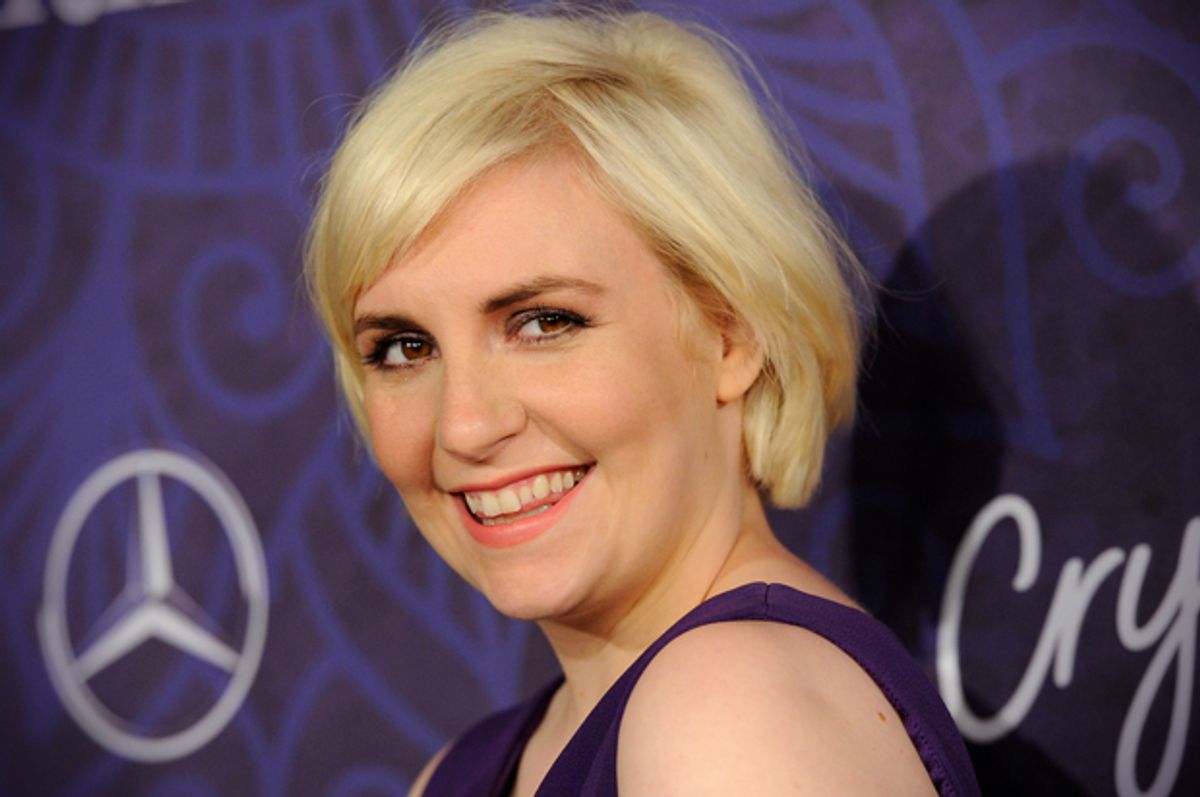On Wednesday night, Lena Dunham concluded her 12-stop book tour in her home-borough of Brooklyn. The writer, director, actress, advocate held a 90-minute event at Brooklyn Academy of Music (BAM) in support of her new book of essays, "Not That Kind of Girl."
Beyond a reading from Dunham, the event included a stand-up routine from Mike Birbiglia, a three-song set from her boyfriend Jack Antonoff of fun. and Bleachers, Dunham in discussion with Zadie Smith and an audience Q&A.
The conversation between Smith and Dunham was unsurprisingly revealing and wound through topics of pop culture, women in the arts, politics and influences. Dunham and Zadie Smith are friends (and email pals). Smith, the audience also learned, was also the one who suggested that Dunham read Karl Ove Knausgaard.
During their conversation Dunham voiced frustration with the way that her characters and works are received. She specifically brought up the reception of her characters in "Girls," and the misunderstanding of her first movie "Tiny Furniture." Brooklyn Magazine reported:
"Their conversation tackled everything from how the characters Dunham creates get attacked incessantly for being “unlikable,” despite not being “Tony Soprano or Walter White,” and that Smith think that has to do with the “double scandal” of not falling victim to the trope of the typical female character who “looks good, but we know she hates herself inside.'"
Flavorwire elaborated with this:
"They also saw eye to eye on the troubling gender gap among unlikeable characters on TV, with Dunham name-checking Tony Soprano, Dexter, and Walter White as male favorites far more villainous than Dunham’s own Hannah Horvath.
"The most fascinating bit of conversation in this vein was something Dunham moved away from quickly: the notion that few truly understood what she was trying to do with her debut film, 2010’s Tiny Furniture. "No one seemed to think 'Tiny Furniture' was a critique of class," she noted, adding that similarly class-tinged, Manhattan-set work by male filmmakers like Noah Baumbach (The Squid and the Whale) are given the intellectual benefit of the doubt. "When you’re a 24-year-old woman, people want to say, 'Could you be any more self-involved?''"
Brooklyn Eagle, a news outlet Dunham has been a fan of since her teens, wrote this of the conversation:
"She explained that Kirke's character in that film, Charlotte, was meant to be an 'embodiment of this privilege — this girl who was so undone by what she'd been given.' Later, Dunham responded to criticism she has heard over the characters on 'Girls. 'That girl was mean to her friends and she should get the death penalty,' she mimicked, while pointing out the irony of that statement when we live 'in a world where Tony Soprano and Walter White are our favorite TV characters.'"
The tour partnered with Planned Parenthood, and the event goodie-bag included condoms, female condoms, lube and information on sexual health. "They've been with me at every stop and we haven't had any protesters, which means either times are changing or the tour wasn't well publicized," Dunham joked.
Dunham also encouraged attendees to vote in the midterm elections -- vote to help all the women living below the poverty line. "We want change, we are change, so we have to vote," she urged.
"As a New Yorker, I used to think all I had to do was vote for Obama, and go back to eating Cheetos and masturbating," Dunham told the crowd of around 200, according to Flavorwire.
The reading itself was an essay titled "Grace," which is about Dunham's younger sister Grace coming out to her. Grace, Brooklyn Eagle points out, is the one who helped organize the collaboration between Dunham's book tour and Planned Parenthood.
Dunham also discussed another strong influence in her life, her mother, who was present in the front row. "My mother was a female artist in a male-dominated art world [and always] told me what was possible for me as a woman," Dunham stated.
"My mother was engaged in her work and confident in her contribution to the world," she continued. "That was the real gift."

Shares